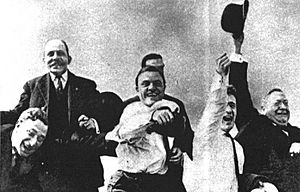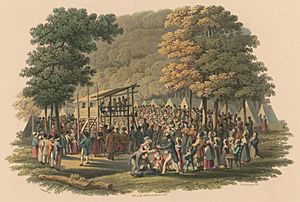Enthusiasm facts for kids
Enthusiasm is a strong feeling of excitement, deep interest, or approval that someone shows. It's often linked to being playful, creative, hopeful, and having lots of energy. Originally, the word meant being filled with a god's spirit or showing intense religious devotion.
What Does "Enthusiasm" Mean?
The word enthusiasm comes from the Greek word enthousiasmos. It means "inspired by a god's essence." The ancient Greeks used it to describe people who seemed to be taken over by a god, like the Pythia (a priestess of Apollo) or the Maenads (followers of Dionysus).
Even Socrates, a famous Greek philosopher, thought that poets' inspiration was a kind of enthusiasm. Over time, the term mostly referred to strong religious inspiration or feelings.
For example, a group in Syria in the 300s AD was called the Enthusiasts. They believed that through constant prayer, strict practices, and deep thought, people could be filled with the Holy Spirit. Because they believed in the power of prayer, they were also known as Euchites.
Later, in the 16th and 17th centuries, some Protestant Christian groups, especially those who held large revival meetings, were called "enthusiastic."
When "Enthusiasm" Was a Bad Word
After the Glorious Revolution in Britain, around the 1700s, "enthusiasm" became a negative word. It was used to describe someone who publicly supported a political or religious cause with too much passion, almost like fanaticism. People at the time saw this kind of "enthusiasm" as the reason for the terrible English Civil War that had happened earlier. So, showing too much enthusiasm was seen as a major social mistake.
The Royal Society, a famous group of scientists, even had a rule: if anyone talked about religion or politics during a meeting, they would be kicked out for being an "enthusiast."
In the 1700s, popular Methodists like John Wesley were accused of having "blind enthusiasm." They defended themselves by explaining that their strong feelings came from a sincere "religion of the heart," not from fanaticism. Methodists who preach about and experience spiritual rebirth often have very emotional experiences.
See also
 In Spanish: Entusiasmo para niños
In Spanish: Entusiasmo para niños
- Artistic inspiration
- Connoisseur
- Emotional contagion
- Entheogen
- Euphoria
- Fan (person)
- Flow (psychology)
- Motivation
- Zest (positive psychology)
 | May Edward Chinn |
 | Rebecca Cole |
 | Alexa Canady |
 | Dorothy Lavinia Brown |



